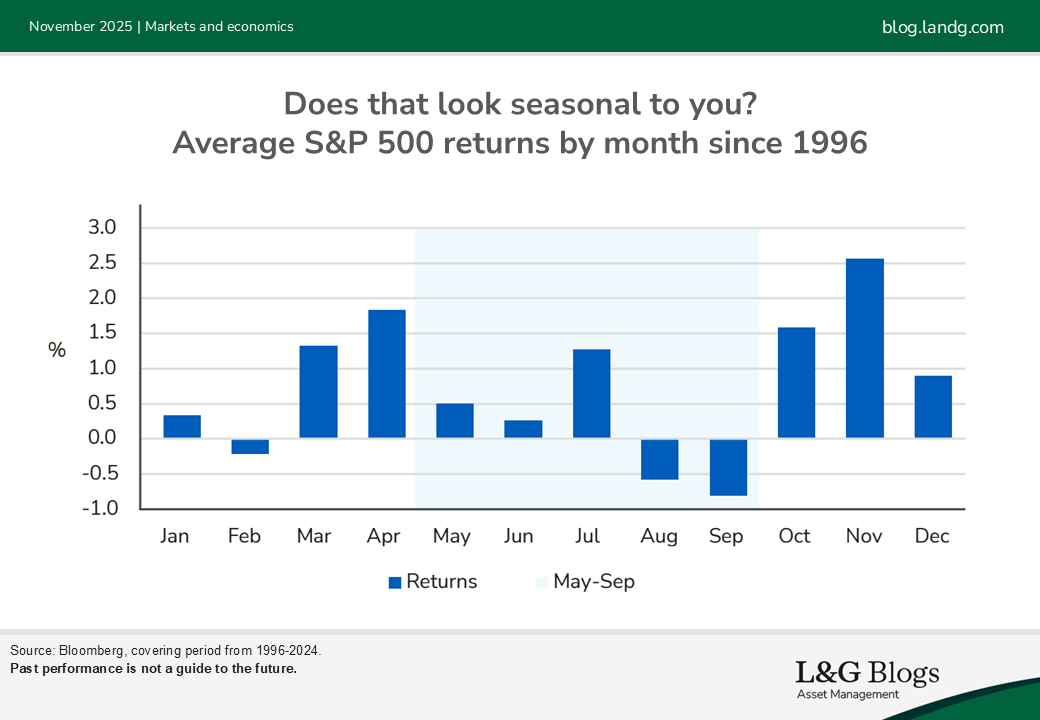Disclaimer: Views in this blog do not promote, and are not directly connected to any L&G product or service. Views are from a range of L&G investment professionals, may be specific to an author’s particular investment region or desk, and do not necessarily reflect the views of L&G. For investment professionals only.
Words of wisdom? “Sell in May and go away”
Our Well-known Investment Saying Evaluation (WISE) index provides an assessment of some well-worn financial aphorisms.

The following is an extract from our research report: Do famous investment savings hold water?
“Sell in May and go away…” – WISE score: 8/15
Durability: 4/5
... and come back on St Ledger’s Day. Although the first use of this phrase is hard to nail down, the frequently forgotten second half links it to a horse race in Doncaster that started back in 1776. Originating in the City of London, this phrase appears equal parts lifestyle advice and financial advice for investors of the time: better to enjoy the summer in the country than worry about your portfolio!
Reliability: 2/5
There is some surprising evidence in favour of this seasonal effect – surprising as there is little reason it ‘should’ work. Several studies[1] have found evidence of lower returns in the summer months.
However, there are a couple of warning signs. First, the evidence is not pervasive across all markets. Second, the significance of seasonality in equity markets is a hotly debated topic (e.g. the January effect appears to be relegated to small companies and so largely untradable due to costs).
Third, there is a tendency to move the goalposts. A lot of papers look at returns from May to the end of October, while horse racing aficionados will know St Ledger’s Day is typically held in September.
Insight: 2/5
As hinted at previously, this particular piece of colloquial wisdom lacks a robust foundation. Perhaps there was some logic back in the 18th century. When the wealthy citizens of London headed off to their country estates for the summer it probably did lead to lower liquidity and more difficulty trading.
In today’s financial markets there are very few assets we would expect to be so reliant on holiday calendars. More generally, seasonality in financial markets features in several academic studies but is hotly debated. Of course, some commodities show seasonality but that is not necessarily a tradeable anomaly.
There is also a larger debate about the number of different ‘anomalies’ in finance and whether they replicate or are just a product of data mining by academics and practitioners.[2] Seasonality needs to considered in this light: a possible feature, but one that often lacks a good economic rationale and isn’t beyond doubt.
Philosophically, we look for risk premia that are underpinned by behavioural biases and structural inefficiencies.

[1] See, for example, Bouman, Sven, and Ben Jacobsen. 2002. The Halloween Indicator, “Sell in May and Go Away”: Another Puzzle. American Economic Review 92 (5): 1618–1635. Also, Hou, Kewei and Xue, Chen and Zhang, Lu, Replicating Anomalies (June 12, 2017). Fisher College of Business Working Paper No. 2017-03-010, 28th Annual Conference on Financial Economics and Accounting, Charles A. Dice Center Working Paper No. 2017-10.
[2] Jensen, Theis Ingerslev and Kelly, Bryan T. and Pedersen, Lasse Heje, “Is There a Replication Crisis in Finance?” (January 30, 2021). NYU Stern School of Business.
Recommended content for you
Learn more about our business
We are one of the world's largest asset managers, with capabilities across asset classes to meet our clients' objectives and a longstanding commitment to responsible investing.

